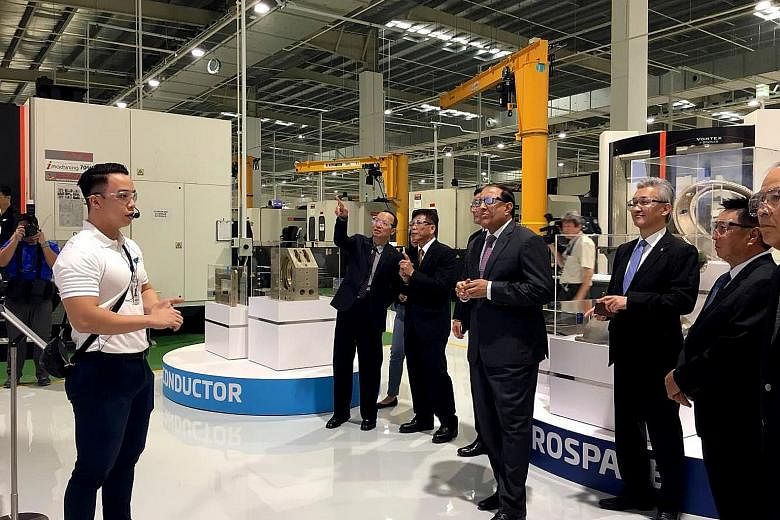A roadmap to transform Singapore's precision engineering sector and build more smart factories has helped kick-start 10 projects since its launch last October.
Three of these projects were started by multinational firms, three by large local enterprises and four by small and medium-sized enterprises (SMEs), said Minister for Trade and Industry (Industry) S. Iswaran yesterday.
The precision engineering Industry Transformation Map (ITM) was rolled out in Budget 2016 as part of a $4.5 billion package aimed at providing companies with industry-specific help to digitalise, invest in new technologies and prepare workers for the future.
Mr Iswaran was speaking at the opening ceremony of JEP Precision Engineering's smart factory in Seletar Aerospace Park.
"I am heartened that companies at different stages of their development are embarking on such projects to strengthen their manufacturing competitiveness by building up in-house digital capabilities," said the minister. He added that these projects are expected to raise productivity in the companies by 30 per cent on average.
The precision engineering ITM aims to raise the sector's output to $42 billion by 2020, from $32 billion in 2014. It also aims to help 50 SMEs receive qualifications as core suppliers to MNCs in high-growth manufacturing segments by 2020.
As of August, 27 companies have qualified, including JEP which supplies key components such as landing gear systems and engine casings to the aerospace sector.
JEP's new 200,000 sq ft facility is 50 per cent larger than its previous premises in Changi Business Park.
The company invested almost $35 million in the new plant, pumping money into smart factory technologies, which include robotic arms and software that allows engineers to monitor the status of machines in real-time.
"When we were planning to build this plant in 2015, we wanted a plant that can sustain us for the next 10 years at least," said JEP Precision Engineering chief executive Soh Chee Siong at the official opening.
Mr Soh told The Straits Times that the company decided to move into digital manufacturing to position itself for the long term.
While there is a "long runway" for growth in the aerospace segment, JEP is also looking to diversify its business into other sectors, he noted. About 80 per cent of the company's business is in aerospace, with the remainder coming from the semiconductor and oil and gas industries.
The company is also expanding into new markets, including China. JEP has signed a joint venture agreement with Kun Shan Hang Fu with the aim of setting up a facility in China in 2019, said Mr Soh.


